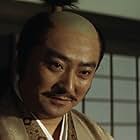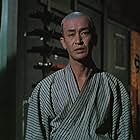A Buddhist priest becomes also a magician, dedicating himself to the protection of life wherever it's needed, whereupon he finds himself in direct service of the Queen. Political intrigue ti... Read allA Buddhist priest becomes also a magician, dedicating himself to the protection of life wherever it's needed, whereupon he finds himself in direct service of the Queen. Political intrigue tightens around him as it is increasingly assumed that he harbors ulterior motives. Set in J... Read allA Buddhist priest becomes also a magician, dedicating himself to the protection of life wherever it's needed, whereupon he finds himself in direct service of the Queen. Political intrigue tightens around him as it is increasingly assumed that he harbors ulterior motives. Set in Japan's Nara Era (710 - 794 A.D.), the story is loosely based on Mikado (Empress) Koken-Sho... Read all
- Director
- Writers
- Stars
Photos
- Prime Minister
- (as Kenzaburô Jô)
- Slave Master
- (as Yoshito Yamaji)
- Director
- Writers
- All cast & crew
- Production, box office & more at IMDbPro
Featured reviews
It's set in Japan's Nara Era (710 - 794 A.D.). The story is loosely based on Empress Koken-Shotoku and Dokyo, a Yamabushi mountain warrior monk who practiced a rugged, intense form of Vajrayana Buddhism.
Teinosuke Kinugasa's movie strikes me as complicated. It is a clear story of compassion set against the implacable intricacies of the powerful ever seeking more power. It is also intensely Japanese in a way that is not clear to my Western mind, a modernized -- and thus incorrect -- view of the island nation when it was struggling to find its own mythic identity. In many ways it seems to me that it could have easily been slanted in the other direction, becoming variation of the death of Rasputin.
Kinugasa is a fine director, and his actors are skilled. Nonetheless, when dealing with mythology, it is important to remember that the symbol may remain the same, but its meaning changes in every era, and for every individual. With its black-and-white characterizations, this seems to me a hagiography. It will speak strongly and clearly to those who already believe its message, but be meaningless adulation of clay idols to those who do not.
It also suffers from another flaw and that is the line between the good guys and bad guys are too broadly drawn . This was a major fundamental problem with Masaki Kobayashi's other wise stunning film trilogy THE HUMAN CONDITION and here Teinosuke Kinugasa brings the same flaw to this film in that Dokyo isfar too pious and righteous to take entirely seriously while the bad guys are obvious greedy for power but we never learn why this is the case for their ulterior motives . Of course there is a subtext of religion here but this is nullified early in the film where Dokyo promises the soul of his mentor that he will improve the lot of the masses which isn't a pledge that is unique to religion and could easily have been made by a secularist . In other words regardless of your religious views the line between good and bad merely exist to make up the story and in effect we have a very simplistic - though well made - film about the abuse of power when it could have tried a lot harder to be complex
I think the acting was great and I did end up enjoy the movie a lot. I would though not recommend this movie to all. Many will be bored as there is very little action in this movie. Mostly it is about the main characters impact on the world and how the world around him affects him.
So all in all more a Japanese political drama than fantasy. Maybe not a masterpiece but definitely worth a look if you find it :-)
Storyline
Details
- Release date
- Country of origin
- Language
- Also known as
- Таинственный монах
- Production company
- See more company credits at IMDbPro
- Runtime1 hour 38 minutes
- Color
- Aspect ratio
- 2.35 : 1
Contribute to this page























